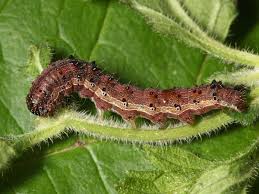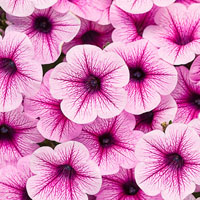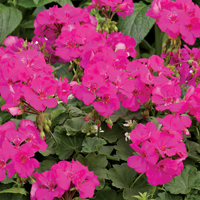Budworm: What's Eating My Petunias and Geraniums?
What's going on, my petunias and geraniums have stopped blooming and there are tiny holes in the leaves, flowers and buds.
Every year we get lots of questions about why some folks’ petunias and geraniums have stopped blooming and why there are all these tiny holes in the leaves, flowers and buds. The problem usually only lasts for about 6-8 weeks, but in some parts of the country it goes on all year long. The insect culprit is Heliothis virescens also known as the Tobacco Budworm, Geranium Budworm and Petunia Budworm. It is a 1” brown moth that usually flutters around the plants in the evening.
But those harmless looking moths lay eggs each evening and they become caterpillars that attack the flower buds and developing flowers. The first clue you have a problem is when the buds cannot open. The petals may also look chewed or have many small holes in them. The caterpillars are pretty small so they can be hard to see. But their excrement looks like someone scattered little black seeds or ground pepper all over the leaves, and that is the second big symptom to look for. The simplest and best solution to budworm control for petunias and budworm control for germaniums, is to apply a non-toxic, caterpillar-specific bacteria (Bacillus thuringiensis - does that sound like science fiction?). This non-toxic pest control for flowers is called DiPel and comes as a powder. You shake the powder over the leaves, flowers and stems of your affected flowers and when the budworms eat your plants, the bacteria in DiPel in turn eat the budworms. It is absolutely harmless to children, pets and wildlife, but very effective in controlling any caterpillar damage, so it will work on your tomato hornworms, army worms or any other caterpillar problems too. Just don’t use it where you are growing plants like parsley or dill to feed caterpillars as it will also kill those good caterpillars and you certainly wouldn’t want that. Since DiPel is a powder, you’ll need to reapply after every rain or overhead watering. The sooner you use this budworm control for petunias and budworm control for germaniums powder to catch the problem, the less damage you will see in your yard. You can also get this non-toxic pest control powder in liquid spray form which can be a bit easier to apply and also leaves less visible residue on your plants. After they ingest the DiPel, the caterpillars will stop feeding within 24 hours and then die. It is simple, non-toxic pest control for flowers and works really well! Don’t let budworms keep your Supertunia® Petunias and Boldly® Geraniums from looking their best this year! Keep them at bay with DiPel or other brands of Bacillus thuringiensis, found at most garden centers. |
|







